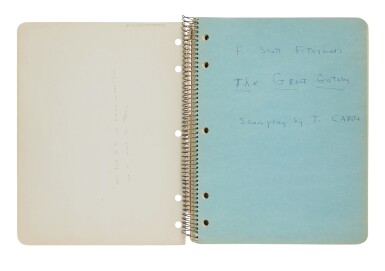
Property from the Jean Hart Kislak Collection
Capote, Truman | Capote's rejected screenplay adaptation of Fitzgerald's Great American Novel
Lot Closed
December 16, 09:01 PM GMT
Estimate
10,000 - 15,000 USD
Lot Details
Description
Property from the Jean Hart Kislak Collection
Capote, Truman
Autograph manuscript signed ("T. Capote" and "Truman Capote"), being an early, partial draft of his screenplay for The Great Gatsby, [Los Angeles, 1971]
133 pages (266 x 200 mm), recto and verso, written in pencil and pen on lined notebook paper; some pages lightly toned, light handling wear throughout, as expected from use. Housed in spiral notebook with stiff yellow upper cover, blue section dividers throughout; yellow cover detached but present, some wear to foot of spine.
"The great house below belongs to my neighbor, a certain Mr. Jay Gatsby. Rich and eligible, so I'm told. I don't know him. I've never met him."
F. Scott Fitzgerald's heralded novel has a long and uneven history with Hollywood. When Paramount Studios hired Truman Capote in 1971 to write a screenplay for The Great Gatsby, it had already been adapted twice for the screen. The present manuscript—an early, partial draft of his screenplay that would ultimately be rejected by the studio—encompasses the first act of the film, from the introduction of Nick Carraway, Tom Buchanan, Daisy, and Jordan at their first luncheon, to the introduction of Myrtle and the raucous party at her New York apartment.
The present manuscript establishes some of the most enduring settings and themes of the novel. On pages 8-10, for example, Capote introduces audiences to Gatsby's estate and excesses for the first time: "A glittering view of coast line ... along Long Island Sound. The plane begins to circle a large seaside estate: a mansion with ... greenhouses, a swimming-pool, a boathouse, gardens, immaculate lawns ... There is quite a crowd gathered round the pool or stretched on the mansion's private beach ... Nick (O.V.): We flew over my part of Long Island. I must be the poorest guy living there. The great house below belongs to my neighbor, a certain Mr. Jay Gatsby. Rich and eligible, so I'm told. I don't know him. I've never met him. But I'll say one thing — he's not the greatest neighbor a man could have. He plays to a full house. Lunch parties. Cocktails. Orchestras that keep the parties going till dawn. The music, all those champagne voices — sometimes I have a helluva time getting to sleep."
The back cover of the journal bears Capote's addresses in both New York and Palm Springs, in addition to the director Jack Clayton's address in England, and "Reward! $500.00" underlined along the top. When Capote delivered his draft of the screenplay, Clayton thought that Capote had adhered too closely to Fitzgerald's novel, and had failed to address some of the structural issues inherent to the source material, noting "It is like a great fish that is all head and no tail." Capote was replaced by Frances Ford Coppola, who was only weeks away from the release his masterpiece The Godfather. Clayton's adaption (starring Mia Farrow and Robert Redford) was released to middling reviews in 1974. Coppola distanced himself from the production in later years, saying "The script that I wrote did not get made."
Truman Capote attempts to adapt Fitzgerald's Great American Novel for the screen.
REFERENCE:
BFI, "The Great Gatsby: files from the making of the glittering 1974 film," 13 May 2013 (https://www.bfi.org.uk/features/great-gatsby-robert-redford-mia-farrow)
PROVENANCE:
Bonham's, New York, February 18, 2007
You May Also Like



